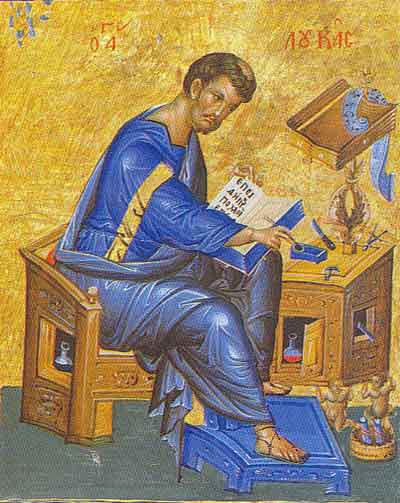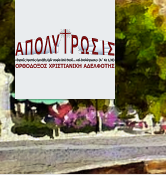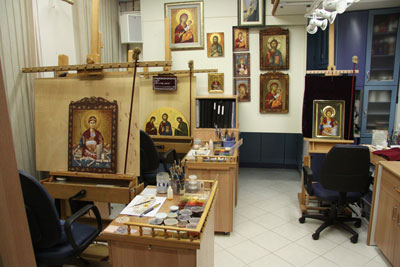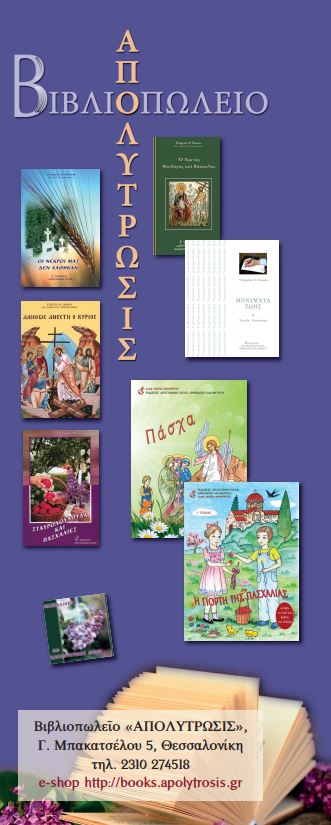Translation from the book:
Στεργίου Ν. Σάκκου, Ἑρμηνεία στό κατά Λουκᾶν Εὐαγγέλιο, τόμ. Α΄,
ἐκδ. «ΧΡΙΣΤΙΑΝΙΚΗ ΕΛΠΙΣ» ΟΡΘΟΔΟΞΗ ΑΔΕΛΦΟΤΗΤΑ, Θεσ/νίκη 2008, σσ. 25-29
(Stergios N. Sakkos [Read CV], A Commentary on the Gospel according to St. Luke, vol. A', pp. 25-29)

Luke the evangelist begins his Gospel with a short introductory note addressed to the recipient of the Gospel, Theophilus. The author, in a clear language and simple style, explains the reason of his work, the way in which he worked to collect his material and the method he followed to record it.
1,1. Ἐπειδήπερ πολλοὶ ἐπεχείρησαν ἀνατάξασθαι διήγησιν περὶ τῶν πεπληροφορημένων ἐν ἡμῖν πραγμάτων.
1:1 Seeing that many have attempted to draw up a narrative of the facts which are received with full assurance among us.
The attempt by many to write narratives about the person of Jesus Christ became a motive for Luke to take over the writing of his Gospel. The “πολλοί” many who are mentioned are not of course the evangelists Mark and John. Luke only knew the Gospel of Matthew, which had preceded his, since his writing is placed in the decade 50-60 A.D. (probably around 55 A.D.). The Gospels according to Mark and John were written after Luke, in the years 64-68 A.D. and 69-72 A.D. respectively. Nor are these “πολλοί” many the authors of the apocrypha or pseudepigraph Gospels (e.g., Peter’s, Thomas’, Philip’s, etc.) The apocrypha began to appear later, in the 2nd-3rd century AD. Besides, if he were to refer to such texts, the evangelist would have questioned them. Luke rather implies some anonymous Christian scholars, who, using as a basis either the oral tradition or their personal notes, had recorded smaller or larger collections of Christ's words and narratives of the facts of his life. These were not false narratives; they were genuine with true data. But, because this was a human initiative and effort, it couldn’t survive through the passage of time. The Gospel is not a narrative characterized only by historical reliability. It also bears the seal of the divinely inspired spirit. When evangelist Luke began his writing, he was conscious of being directed by the Holy Spirit to deliver to the "the heathen" Christians - just as Matthew to the “circumcised" - divine truths and events of salvation significance.
Many interpreters, relying only on the use of the verb have taken in hand, came to the wrong conclusion that those who attempted to write short narratives intended to misguide the faithful. Others understood those who tried to write something, but had not been able to complete it. The verb, however, has a neutral meaning. It means "putting my hand on something, taking over, attempt."
The co-expression “to draw up a narrative” belongs to the "once-so-called" of the Holy Scriptures; It means the arrangement of the content, the draft of the content which the oral tradition saved about Jesus.
Hence, many tried to write a narrative about what they have been informed. In the brief and concise interpretation of Zigavinos; «εἰσὶ δὲ ταῦτα τὰ πράγματα... ἡ ἔνσαρκος αὐτοῦ (τοῦ Ἰησοῦ) πολιτεία», "these facts are... his (Jesus’) incarnate life", i.e., the acts and words, miracles and teaching of the Lord (cf. Acts 1:1-2). All these are known to the believers of the next generation, among whom Luke includes himself among us. These are not legends and folk traditions, but undeniable events which, with a sense of responsibility and piety, were entrusted to Christians by the preachers of God's word. The verb «πληροφοροῦμαι», when it refers specifically to events, it means “absolute trust” that “I become absolutely believable”.
1,2. καθὼς παρέδοσαν ἡμῖν οἱ ἀπ’ ἀρχῆς αὐτόπται καὶ ὑπηρέται γενόμενοι τοῦ λόγου.
1:2 Just as they were handed down to us by those who from the first were eyewitnesses and servants of the word.
The many referred to in the previous verse - including Luke - received the Lord's teaching from reliable sources. Those who were from the beginning, they were eyewitnesses, and they delivered their testimonies to the next ones who received them. It becomes apparent that Luke was not among the eyewitness-disciples of Jesus Christ. This information is also recorded in Muratori's catalogue, where we read (in the Greek version); "Luke is called a doctor, zealot of the law, Paul’s companion, who did not see the Lord in flesh but he wrote as he had been informed “ἄνωθεν".
The apostles are eyewitnesses, who personally attended what Jesus did and taught during the three years of his public actions. They were entrusted to be the servants of the word and transmit what they had seen and heard by testifying these with the power of the Holy Spirit (see Mt 28:19-20; Acts 1:8).
1,3. ἔδοξε κἀμοί, παρηκολουθηκότι ἄνωθεν πᾶσιν ἀκριβῶς, καθεξῆς σοι γράψαι, κράτιστε Θεόφιλε.
1:3 It has seemed right to me also, since I myself have carefully investigated everything from the beginning, I too decided to write an orderly account for you, most excellent Theophilus.
In this verse Luke describes the way in which he worked. He points out that his narrative is not based on hypotheses or disputed data, but on his own personal research. Luke, of course, was Apostle Paul’s disciple. Undoubtedly, however, he also met the other apostles who belonged to the group of the Lord’s twelve disciples. In addition, he collected important information from the Lord's own mother.
Therefore, he dealt with a serious historical research, as the participle “παρηκολουθηκότι” states. He made sure of all the facts from the beginning, “ἄνωθεν”, and “πᾶσιν”, precisely, with accuracy. His Gospel begins with the pre-announcement of the birth of John the Baptist and continues by offering a complete picture of the Lord’s life and teaching, with a lot of information that is not mentioned in the other Gospels. The recording of all this material is characterized by a systematic arrangement. The word “καθεξῆς” refers to that, and not to a strict chronological order; this order exists only in the first (chapters 1-2) and in the third part (chapters 22-24) of this Gospel.
The responsible historical research and the style of the text bear Luke's personal stamp. The Gospel being “God-inspired” does not diminish the educational level or the intellectual abilities of the author. In his research, of course, as in the selection and arrangement of the subject material, the evangelist had unquestionably the guidance of the Holy Spirit, secured of any error and brightened the talents that adorned Luke.
From the address, “excellent Theophilus”, we realize that the recipient of the Gospel had a high social position. We meet the same title "Your Excellency", with the same meaning in the book of the Acts of the Apostles (see 23:26; 24:3; 26:25). If it is true that Luke was a military doctor in Philippi, where a Roman legion was based, Theophilus may well have been one of the supreme lords of Philippi.
From the authors of the Gospels, the two, Matthew and John, are among the first generation of believers, while the other two, Mark and Luke, belong to the second generation. This is very important as far as the one and only tradition of the Gospel is concerned. As it is well known, many lines can pass through one point, while only one line passes through two points. Two eyewitnesses testify Jesus’ life and teaching, and there are two more through whose testimony, the Gospel was delivered from one generation to the next. The agreement between these four witnesses confirms the reliability of the Gospel narratives.
1,4. ἵνα ἐπιγνῷς περὶ ὧν κατηχήθης λόγων τὴν ἀσφάλειαν.
1:4 so that you may know the certainty of the things you have been taught.
Theophilus had already known the truth of the Gospel, but it was necessary to proceed to a more essential and complete knowledge, as he states “ἵνα ἐπιγνῷς”. Oral teaching, after all, is always at risk of change over time. Luke, with his Gospel, aims to secure and guarantee catechism. In the language of the scrolls of the Greek and Greek-Roman era, "ασφάλειαν" mainly means the written guarantee of a financial agreement (proof, contract, promissory note etc.) Luke, in other words, tried to offer Theophilus a written and complete teaching (catechesis), which would be the guardian and guarantor of the oral apostolic tradition.
The Gospel according to Luke, therefore, is a catechetic letter, containing the teaching of the apostolic times. But in every age the Gospel must be the main teaching of the faithful. Other useful narratives might seem more attractive and fascinating. However, it is the God-inspirited word of the Holy Scripture that transforms, cultivates and sanctifies. Saint John Chrysostom advises: "So sanctify your soul, sanctify your body by always having them (the words of the Holy Scriptures) in your heart and lips. For, if obscenity pollutes terribly and invites demons, it is obvious that spiritual reading sanctifies and attracts the Holy Spirit’s grace. These words are divine melodies. So, let them become within us the refrain, and by using these let’s make the medicines for the passions of the soul. If we realize the value of these readings, we will listen to them willingly”.
Copyright © 2021 by Orthodox Christian Association «ΧΡΙΣΤΙΑΝΙΚΗ ΕΛΠΙΣ» ΟΡΘΟΔΟΞΗ ΑΔΕΛΦΟΤΗΤΑ. Used by permission. All rights reserved.









